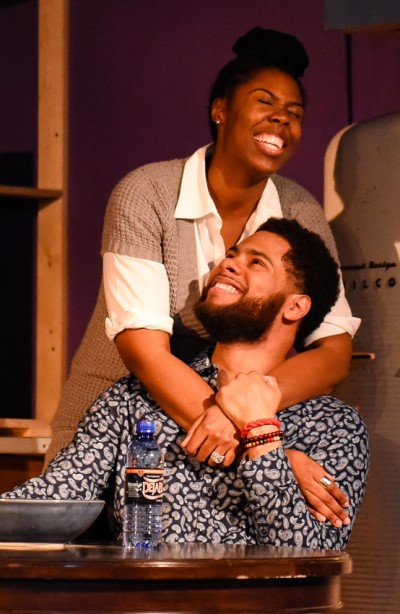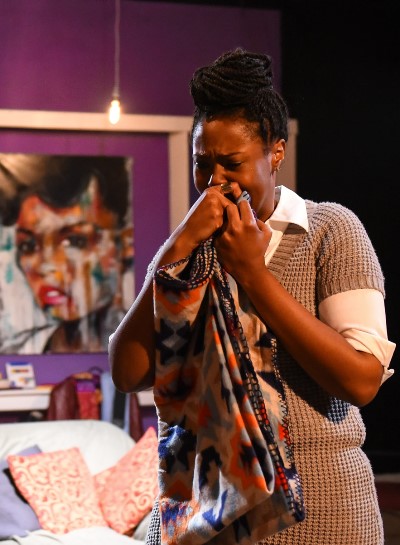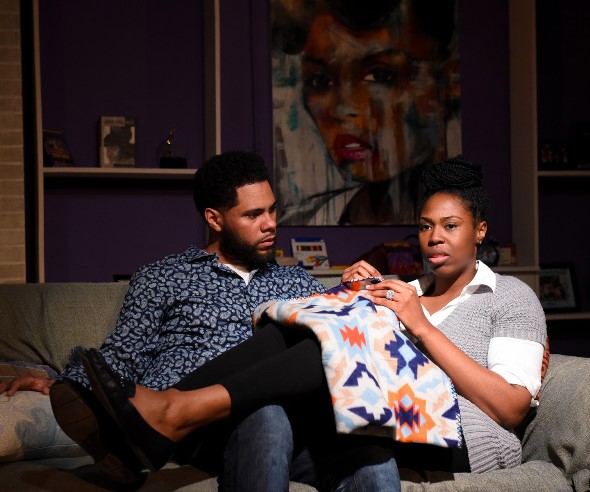‘The Light’ at New Colony: Lovers sparring, teasing; then the earth opens and pain erupts
“The Light” by Loy Webb, world premiere produced by The New Colony at The Den, extended through Feb. 25. ★★★★★
By Lawrence B. Johnson
Gen is trapped in a numbing confluence of righteousness and anger, paralyzed between the ideal of goodness and the reality of imperfection. She’s the everywoman – specifically, every black woman — of Chicago playwright Loy Webb’s stunning new work “The Light.”
 Genesis, the full name of this thirtysomething school principal and unmarried rock of self-reliance, is one-half of Webb’s two-hander, a phrase that applies doubly to “The Light.” The woman now walks hand in hand with the man she really, really hopes will soon ask her to marry him.
Genesis, the full name of this thirtysomething school principal and unmarried rock of self-reliance, is one-half of Webb’s two-hander, a phrase that applies doubly to “The Light.” The woman now walks hand in hand with the man she really, really hopes will soon ask her to marry him.
That’s Rashad, also thirtysomething, a fireman, once married, father of a daughter age 5 “going on 55.” Rashad seems like a stand-up guy, though he lives with the shattered dream of a shot at the NFL. He lost his college football scholarship when he was accused of rape. Not charged, just accused. And he was gone. But he’s crazy about Gen, and on this night, the second anniversary of their first date, he has a clutch of presents for her, a very small box among them.
“The Light” might be described as a redemptive tragedy, albeit one that begins as a romantic comedy. Taking it that challenging distance are two actors who have the chemistry, the conviction, the magical wit to make us believe equally in the euphoria their characters inspire in each other — and in the near-death collision that awaits them at the play’s last turn.
 Tiffany Oglesby offers a thoroughly appealing Genesis, as outwardly confident and savvy as she is devoted to her kids – her “babies” – at school. She has an attractive apartment (done up by set designer John Wilson). She also has Rashad’s number and doesn’t hesitate to call him on his transparent ruses or his vain posturing. Jeffery Owen Freelon Jr.’s indeed lovable guy thinks himself – even at the onset of middle age – a pretty cool dude that Gen obviously couldn’t resist from the get-go.
Tiffany Oglesby offers a thoroughly appealing Genesis, as outwardly confident and savvy as she is devoted to her kids – her “babies” – at school. She has an attractive apartment (done up by set designer John Wilson). She also has Rashad’s number and doesn’t hesitate to call him on his transparent ruses or his vain posturing. Jeffery Owen Freelon Jr.’s indeed lovable guy thinks himself – even at the onset of middle age – a pretty cool dude that Gen obviously couldn’t resist from the get-go.
But in every sense, he’s met his match in her. When he playfully demands that she admit she went for him because he was “ripped and tight,” she shrugs and waves such presumption away: Fool, it was that adorable little girl standing next to you that caught my eye.
That’s how the banter goes, two lovers, two free agents, jousting and jesting, taunting and tantalizing. Rashad knows a lot about this woman by now, but he still hasn’t extracted an explanation for the small, worn blanket she keeps folded on the coffee table, and endlessly picks up, caresses and refolds. What’s with all that? Gen says the blanket is just something her mother gave her. But whenever she becomes agitated, she reaches for that swatch of cloth, opens it and folds it again.
 “The Light” plays out in real time, about 75 minutes; and we’re about halfway in when this auspicious anniversary night is sent careening off course by one of Rashad’s gifts to Gen. It’s a pair of concert tickets, a major score by Rashad – but the gift is rebuffed. For Gen, the tickets set off powerful, horribly painful associations, and in no time her mutating, swelling, widening rage has swept up this man whom she now reduces to contemptuous simplicity: the repugnant category of All Men.
“The Light” plays out in real time, about 75 minutes; and we’re about halfway in when this auspicious anniversary night is sent careening off course by one of Rashad’s gifts to Gen. It’s a pair of concert tickets, a major score by Rashad – but the gift is rebuffed. For Gen, the tickets set off powerful, horribly painful associations, and in no time her mutating, swelling, widening rage has swept up this man whom she now reduces to contemptuous simplicity: the repugnant category of All Men.
It can be argued that the skill of listening actively concedes nothing to the mastery of speech. As Oglesby’s Gen grew more tormented, fierce and desperate, Freelon responded with the nearly silent mortification of a man who sees the earth opening beneath his feet and hasn’t the slightest clue how to save himself. When Rashad does manage to say something, it’s the wrong thing.
Progressively, we come to realize that “The Light” is not strictly about two smart young adults on the threshold of a promising life together. At its core, it’s about a woman who lives and thrives at the boundary between light and shadow, within the grasp of a looming, hideous specter.
The last scene is Oglesby’s alone. Terrified to distraction, Gen contemplates the possibility of grace that has been placed before her. What ensues bespeaks the collective masterstroke of playwright, actress and director Toma Langston: the woman as both frightened, convulsing child and rational, counseling parent to herself. It is the essence of catharsis – no less for the viewer, I suspect, than for this wounded and isolated soul.
Related Link:
- Performance location, dates and times: Details at TheatreInChicago.com
Tags: John Wilson, Loy Webb, The Den, The New Colony, Tiffany Oglesby, Toma Langston


